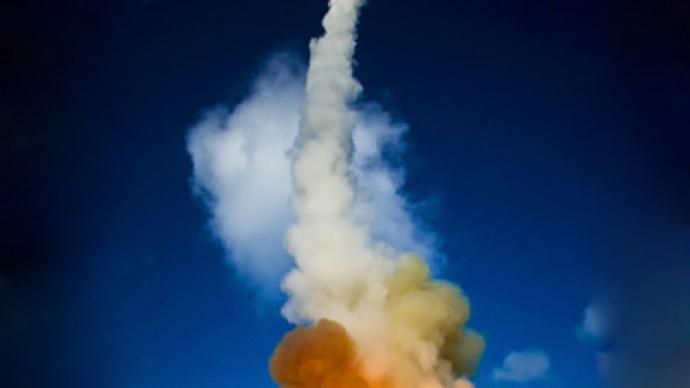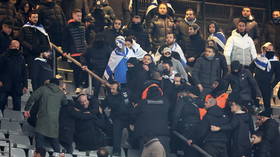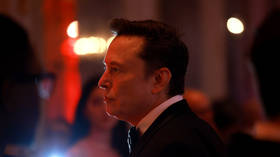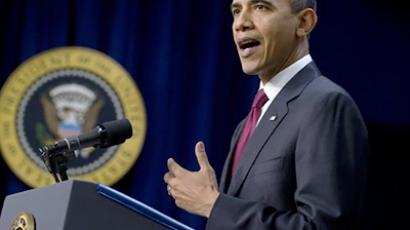US Senate approves New START

After months of intense partisan wrangling on Capitol Hill, the US Senate finally ratified the new START nuclear arms reduction treaty with Russia by a 71-26 vote.
With the ratification, Russia and the US will start the New Year with a treaty that has become a symbol of trust and cooperation between the two nuclear superpowers.Presidents Barack Obama and Dmitry Medvedev both signed the agreement in April in Prague, but it has since been bogged down by delays across the Atlantic.Both the White House and the Kremlin see the deal as a cornerstone to renewed US-Russian relations, and a huge boost to worldwide nuclear nonproliferation.There were fears, however, that Senate Republicans would prevent the deal over unrelated domestic issues, including tax measures and gays serving in the military.Intensive personal lobbying in recent days by Obama helped sway Republican opponents to get the treaty through Congress.“I am glad the Democrats and Republicans came together to approve my top national security priority for this session of Congress, the new START treaty,” Obama declared after the final vote. “This is the most significant arms control agreement in nearly two decades. And it will make us safer and reduce our nuclear arsenals along with Russia.”Both the US and Russia have some very significant reductions underway: over the next 10 years the countries will cut their nuclear arsenals by a third, down to no more than 1,550 deployed warheads on each side. The deal also limits the number of delivery vehicles and launchers and allows for the monitoring of each other's programs to ensure compliance.But even with those cuts, both Russia and the US will still hold more than 90 percent of the world’s nuclear weapons.Many agree that the value of the new arms reduction treaty is not just in reductions.For weeks and months, the president of the United States, senior members of his administration, the military, and all living former secretaries of state and of defense were calling for senators not to ruin this reset opportunity for US-Russia relations.Despite the huge support the treaty has received on many levels, a number of Republican Senators nearly sabotaged it.Their actions provoked an avalanche of criticism from the country’s top security experts, who feared that the treaty could become a victim of political games on Capitol Hill. In the final days of debate on START, some Republican senators tried to rewrite the deal, which would have actually killed it.They wanted to take out the line in the preamble which makes the connection between offensive and defensive weapons.But all of those from the military who testified before the Senate said the connection mentioned in the treaty is obvious.They also maintained it is not START that would make the US weaker.The treaty itself explicitly says either side can pull out of it if at some point they deem it threatens their national security.For Russians, this new START treaty is about balance and equality.“Through the established basis of the contract – the principles of equality, parity, and the equal and indivisible security of both parties – this becomes the new gold standard for the conclusion of our agreements,” stated Russian Foreign Minister Sergey Lavrov. “The agreement not only strengthens the security of Russia and the United States, but has beneficial effects for international stability and security in general.”In Russia, the outcome of the vote in the US Senate was welcome, and for many in Moscow it is a signal that the US and Russia can now open a new page of cooperation.The deal will be finally sealed when Russian lawmakers in the State Duma follow suit and ratify the treaty, a process which is expected to be a formality.Russian lawmakers made it clear they had no objections to the treaty, and would pass it as soon as the US did.Russia's State Duma speaker Boris Gryzlov says ratification could happen as soon as Friday. “We agreed to act simultaneously. We are ready to consider this issue. But we have found out that the ratification resolution has a number of conditions, hopefully in the next few hours we will receive this document,” Boris Gryzlov said. “After that we will be able to make a decision on how we'll go about ratifying this treaty. If the conditions in the ratification resolution don't change the text of the treaty, we should be able to ratify it as soon as tomorrow.”Sergey Lavrov said Russian lawmakers will start voting on the treaty as soon as they get the ratification resolution document from the Senate. “As the presidents have agreed, the process of ratification will be synchronized. We have passed through all the stages of committee hearings in the State Duma. The Russian Foreign Ministry was actively involved in this process in the State Duma and in the Federation Council,” Sergey Lavrov said. “During those hearings we presented our parliament members with information concerning various positions in the US Senate and some amendments to the ratification resolution. This is an important aspect of the whole process, because we still haven’t seen the final text for obvious reasons – this will affect what amendments our parliament members will make to our ratification resolution.”
Commenting on how long it took to ratify the treaty, Ivan Eland, a political analyst from the Independent Institute in Washington, argues it is common practice for the Senate first to oppose a treaty and then accept it.“I think what happens on many Senate votes is that they dig in their heels, they’re trying to bid up the price on what the administration has to pay to get the treaty, not in physical cash, but in programs handed out to their constituents,” he said. “They pretend to be on the line so they can get more, playing hard to get, and then, when the treaty comes, they don’t want to be seen as having missed the chance for a historic vote on a major treaty.”
Viktor Kremenyuk, Deputy Director of the Institute of USA and Canada Studies in Moscow, said that Obama’s success in pushing the treaty through means that the Democrats and Republicans have realized that there are joint interests uniting them. “It may cool down a bit the anxiety of some people who were speaking of the losses of the Democratic Party during the recent election, and saying that this is the end of President Obama and so on. No,” Viktor Kremenyuk said. “What President Obama has done in this area corresponds with major US national security interests and I think it’s good that the other party, I mean the Republican Party, has understood it and supported him through the ratification of this treaty. That means that the US political establishment now has come to understand that some joint interests unite both parties, and I think that may facilitate interaction between the US and other nations, including Russia.”
Topped with the approval of the new START treaty, Obama is entering the new year on a strong note, says Charles Kupchan from the Council on Foreign Relations.“Obama goes into 2011 with a lot of wind in his sails,” Kupchan said. “He had the domestic side, now he has got the foreign policy. That doesn’t mean it is smooth sailing, because he will face a Republican Congress come January, but it is certainly a boost of Obama’s political momentum.”
Max Bergmann, a nuclear non-proliferation analyst from the Center for American Progress think tank, says the signing of the treaty will demonstrate to the rest of the world that the US and Russia are serious about arms reduction, and this could be a sufficient motive for other countries to follow their lead. “I think it sends a clear signal of where the world is headed, and that’s the world with fewer, not more, nuclear weapons,” he said. “So I think it sends a very positive signal and ensures that global nuclear stability can be maintained and more progress can take place after this. There will likely be a new round of negotiations with the Russians to try to go even deeper.”
Tom Collina, research director at the Arms Control Association, said the ratification could usher in further cooperation in reducing nuclear stockpiles.“It is a great boon for Russia-US relations and hopefully will lead to further negotiations on deeper cuts in nuclear arsenals, addressing tactical short-range nuclear weapons as well,” Collina said. “I think this is just the beginning of a much more fruitful relationship between both sides.”
Advocates of the treaty say it is not so much Obama’s victory but a victory for the whole world, which, on the one hand, is going to have considerably fewer weapons of mass destruction, and on the other hand, gets the two nuclear superpowers and former adversaries actually trusting each other and looking to work together to provide security.













